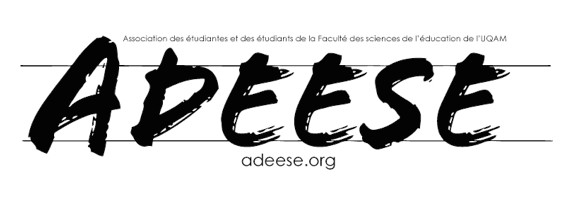UQAM Student Association Votes to leave FEUQ
Education students at UQAM voted to leave the federation of student associations in a referendum vote in January.
In the vote held by the Association des Étudiantes et Étudiants de la Faculté des Sciences de l’Éducation (ADEESE), 484 students voted to leave the Fédération Etudiante Universitaire du Québec (FEUQ) and 149 people voted to stay. The association represents about 5,000 students.
The FEUQ couldn’t comment before an election report is presented at the ADEESE general assembly later today.
“Around September, at the General Assembly, people wanted to talk about FEUQ,” told Xavier Dandavino from ADEESE. “We said, it’s been a while since we asked ourselves the question about staying with them.”
This is the second time education that students under the ADEESE mass union were asked to vote on the issue. ADEESE has been part of FEUQ since 1991.
Following student strikes in 2005, a number of student associations like ADEESE left or became critical of the FEUQ. A 2005 vote to leave the federation failed because too few members participated.
Some students felt the FEUQ was neither transparent nor democratic enough, stated Dandavino. They were upset by the way the national representative effectively ended the strike in 2005 by recommending that associations sign an agreement with Quebec.
FEUQ critics also argue that national groups control the discussions too much, leaving little room for the interests of local associations.
“Since the 2012 strike, a lot has changed,” he said about ADEESE. “Education students are having more general assemblies than ever before. It’s very politicized—many days of strike against austerity were adopted.”
“This new way of working, more combative we can say, is less in line with the FEUQ’s position,” he added.
The FEUQ must now validate the results before the associations part ways.
In the Fall, ADEESE drew up a contract outlining the terms of the referendum that should fit the legal requirements now that it’s backed by the referendum.
“Since the 2012 strike, a lot has changed. Education students are having more general assemblies than ever before. It’s very politicized—many days of strike against austerity were adopted.” — Xavier Dandavino, ADEESE
“Normally everything should pass well, we shouldn’t have problems of having the result recognized at the GA of ADEESE and administration at the FEUQ,” Dandavino said.
Separating from the national association will give ADEESE more time to work on local projects and issues at UQAM, he continued. A major issue among education students is getting paid for internships.
Most education students intern for several weeks in a term to work for no pay, while internships in computer science, engineering and accounting are often remunerated.
“It’s certain that without a national association, it’s more difficult because the go-between people when talking about remuneration for internships is the provincial government.”
But ADEESE is working with education students at the Université de Laval on a new long-term association, CRAIE (Campagne de revendications et d’actions interuniversitaires des étudiantes et étudiants d’éducation en stage).
“It’s premature to say it can be a big organization, but for sure it’s a good base,” said Dandavino.
There is also the possibility of working with the Association pour une solidarité syndicale étudiante (ASSÉ). But ideally, Dandavino says, students in education will band together to fight for issues relevant for them.
Meanwhile, the Fédération Étudiante de l’Université de Sherbrooke (FEUS)—the umbrella student association at the University of Sherbrooke—has held two referenda on staying with the FEUQ.
Executive Joël Vaudeville says some faculties are critical of what they see as FEUQ’s culture of secrecy and of the fact that they had difficulty obtaining certain documents. They also oppose the FEUQ’s “Montreal-centrist” focus.
“It was disconcerting for students, knowing that the location of the FEUQ’s headquarters meant there were better relations with members in Montreal,” said Vaudeville. “People felt they had fewer relations and were consulted less because they were so far.”
Some faculty associations asked to join the provincial federation directly instead of going through the FEUS. The education, law and engineering faculties wanted to negotiate the terms of their membership.
Supporters of the FEUQ responded that power is in numbers. They argued that their organization was not simply a political tool; it also had expertise in the “student condition.”
“The FEUQ is a big structure, imperfect of course, but it allows change in student issues,” said Vaudeville.
Without FEUS, he said, the FEUQ can’t continue to exist as a representative body, as it would only represent students in Montreal and Abitibi-Témiscamingue.
Because the question was clear, and there was a contract negotiated by both sides, the FEUS supports the referendum results.
“If the FEUQ or ADEESE denies the legitimacy of the vote, they’ll deny their own signatures,” he said. The FEUS is not planning to hold another referendum.
“We don’t see how the results can be contested by FEUQ,” said Karl Bernatchez, an education student from the No to FEUQ committee, explaining that he believed both sides were consulted regularly.
“We’re really happy with the results of the referendum. They were clear results,” Bernatchez said.
ADEESE plans to maintain good relations with the FEUQ.
“Even if we’re separated, we won’t slam the door in their face,” said Dandavino. “We’re still part of the collective student movement.”





__600_375_90_s_c1.jpg)
_1_600_375_90_s_c1.jpg)
05_600_375_90_s_c1.jpg)